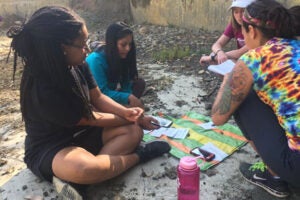A Smart Career Choice: ECU Undergraduate Anthropology Programs
 You’re thinking about majoring or minoring in anthropology, or perhaps gaining more specific marketable skills via one of our certificates? Thanks for your interest. Anthropology is among the newest of the academic disciplines, but also one of the most far-reaching. The fact that you’ve discovered us sets you apart. The first thing you should know is that anthropological tools are in demand across multiple employment sectors. Anthropologists ask good “why” questions, understand how people and communities work together, are skilled analysts of past and present, and are often counted upon to bring new ideas and understandings to bear in answering some of society’s most difficult questions. The solutions anthropologists offer help to make the world better as a result, too. You’ll find anthropologists in hospitals, courtrooms, businesses, legislatures, community development groups, museums, classrooms, web and product design, global aid provision, and in many, many other career tracks. Their business cards rarely contain the word “anthropologist.” Instead, they are hired, and successful, because of the anthropological tool kit they receive during undergraduate study.
You’re thinking about majoring or minoring in anthropology, or perhaps gaining more specific marketable skills via one of our certificates? Thanks for your interest. Anthropology is among the newest of the academic disciplines, but also one of the most far-reaching. The fact that you’ve discovered us sets you apart. The first thing you should know is that anthropological tools are in demand across multiple employment sectors. Anthropologists ask good “why” questions, understand how people and communities work together, are skilled analysts of past and present, and are often counted upon to bring new ideas and understandings to bear in answering some of society’s most difficult questions. The solutions anthropologists offer help to make the world better as a result, too. You’ll find anthropologists in hospitals, courtrooms, businesses, legislatures, community development groups, museums, classrooms, web and product design, global aid provision, and in many, many other career tracks. Their business cards rarely contain the word “anthropologist.” Instead, they are hired, and successful, because of the anthropological tool kit they receive during undergraduate study.
A Little Bit About Us
The anthropology department at ECU is an applied department, meaning that we specialize in teaching the tools you’ll need to make your efforts and observations useful – whatever workforce you aspire to. Below you’ll find details about how we do just that. Our major is the most engaged means of learning how to see the world as an anthropologist and is designed to provide both three-field (cultural, biological, archaeological) career training and preparation for graduate study. Our minors in anthropology and in medical anthropology allow students to achieve a specialized skill set that works well with another major. Finally, students with interest in forensics, cultural resource management, or global cross-cultural competency (often as applied to business or development) are able to take on specialized training in these areas.
Hands-On Learning
Our curricula are designed to go hand-in-hand with opportunities such as study abroad, field schools, internships, community-based learning, and independent research. Employers appreciate the hands-on education that these opportunities convey, and we’re eager to help advise you on how to make the most of your ECU undergraduate anthropology experience.
Better Late Than Never
We know that not everyone arrives at ECU knowing what anthropology is, so we specialize in helping students make the most of their existing credits while declaring a new major or minor in anthropology. We can’t wait to help you get started on your anthropological career.
We welcome your inquiries through the contact us page or via email to our Director of Undergraduate Studies.
The Anthropology Major
The Core (4 courses, 13-14 hours):
- ANTH 2000: Archaeology Around the World
- ANTH 2010: Societies Around the World
- ANTH/BIOL 2015 and 2016(lab): Intro. to Biological Anthropology
One methods course from:
ANTH 3077: Arch. Methods, ANTH 4400/4401(lab): Human Skeletal Analysis, ANTH 3050: Ethnographic Field Methods
Five elective courses (15 hours) chosen from across the subfields. See the current catalog and the current listing of courses (DOCX) for next term for current lists of interesting courses to take. A single 1000-level ANTH course can count as one of your electives.
The Capstone (one course, 3 hours):
ANTH 4025: Theory in Anthropology
Your major is further supported by general education requirements, demonstrated foreign language proficiency through level 2004, a minor and general electives to complete ECU’s graduation unit requirements.
The Anthropology Minor
The Core (3 courses, 10 hours):
- ANTH 2000: Archaeology Around the World
- ANTH 2010: Societies Around the World
- ANTH/BIOL 2015 and 2016(lab): Intro. To Biological Anthropology
Three elective courses (9 hours) chosen from across the subfields. See the current catalog and the current listing of courses (DOCX) for next term for current lists of interesting courses to take. A single 1000-level ANTH course can count as one of your electives.
The Medical Anthropology Minor
Medical Anthropology Minor Catalog
The Core (4 courses, 10 hours):
- ANTH 2010: Societies Around the World
- ANTH/BIOL 2015 and 2016(lab): Intro. to Biological Anthropology
- ANTH 3252 Medical Anthropology
Three elective courses (9 hours) chosen from a curated list relevant to those interested in a wide array of health professions. See the current catalog and the current listing of courses (DOCX) for next term for current lists of interesting courses to take.